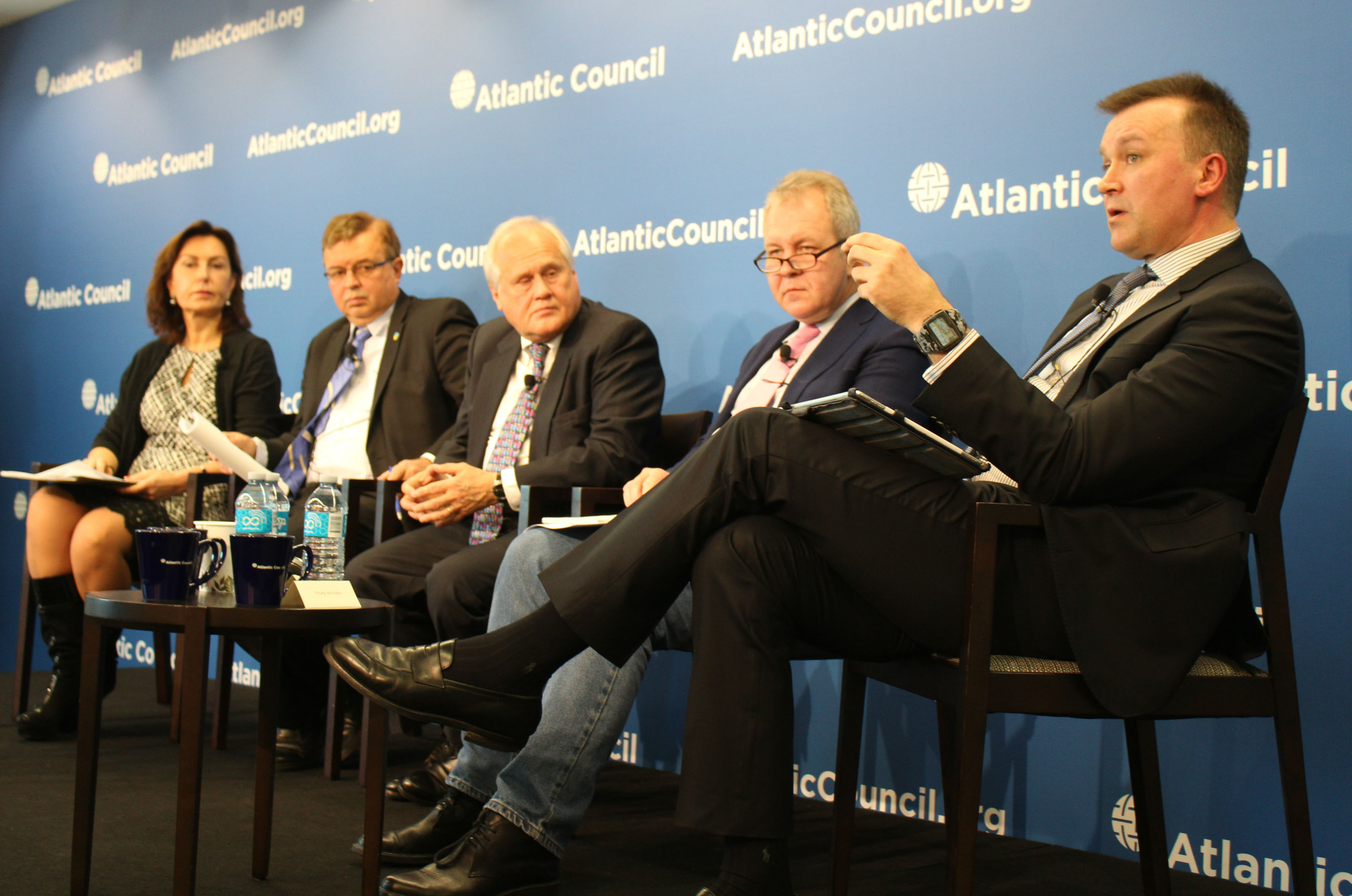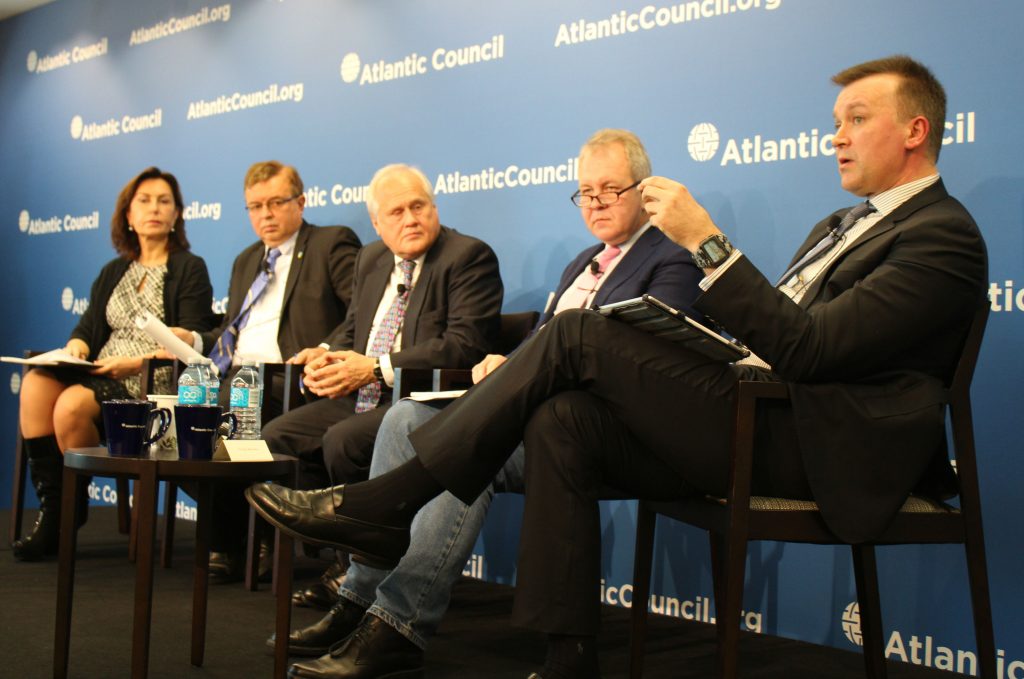 “What we need most of all is the end of hostilities,” said Martin Sajdik, Special Representative of the OSCE Chairperson-in-Office in Ukraine and the Trilateral Contact Group on the implementation of the peace plan in eastern Ukraine, at an event about Ukraine. “Without international assistance from the EU, from the United States, from Japan…I don’t think that one can see a fast recovery—and a fast recovery is definitely necessary to have the people believe in the future.”
“What we need most of all is the end of hostilities,” said Martin Sajdik, Special Representative of the OSCE Chairperson-in-Office in Ukraine and the Trilateral Contact Group on the implementation of the peace plan in eastern Ukraine, at an event about Ukraine. “Without international assistance from the EU, from the United States, from Japan…I don’t think that one can see a fast recovery—and a fast recovery is definitely necessary to have the people believe in the future.”
“The priority is the people,” agreed Oleksandr Petryk, alternate executive director of the International Monetary Fund.
Sajdik and Petryk joined other experts at the Atlantic Council for a December 14 conference examining the future of Ukraine’s economy; the event included two panels and a keynote speech.
Moderated by Irina Paliashvili, senior counsel at the RULG-Ukrainian Legal Group, the first panel focused on the Donbas and included Sajdik; Petryk; Vitaly Butenko, commercial director of DTEK Energy; and Vladislav Inozemtsev, director of the Center for Post-Industrial Studies in Moscow. John E. Herbst, director of the Atlantic Council’s Dinu Patriciu Eurasia Center, and Valeriy Chaly, Ukraine’s ambassador to the United States, offered welcome remarks.
The discussion focused on the dire state of the economy in the Donbas and what can be done to help current residents. Approximately 2.5 million people remain in the separatist-controlled areas of the Donbas, and the situation there is fluid. Former residents of the Donbas are moving back because of high living costs elsewhere in Ukraine, and because the security situation isn’t as dire as it once was, said Sajdik.
But at the moment, there are five crossing points and crossing in either direction can take four to five hours. Sajdik said he remembers seeing people crossing from government-controlled Ukraine into separatist-controlled areas last year, dragging Christmas trees three or four kilometres. “This is really sad,” he said.
Ukraine stopped paying pensions to people who live in the separatist-controlled areas. To get a pension, said Sajdik, one must establish residency in the government-controlled area. For the elderly, making this move is difficult, if not impossible.
Butenko, the commercial director of DTEK, described the difficult situation the company was in when hostilities broke out. DTEK, a company with twelve coal mines and six coal-producing plants in the ATO (the separatist-controlled territories in the Donbas), faced serious operational, logistical, and legal challenges as the war in Ukraine erupted. The company has a combined professional workforce of 50,000 employees in the ATO zone.
Ukraine’s energy sector could easily be compromised by any interruption of coal, said Butenko. The company “took a strictly non-political approach: one Ukraine, one DTEK. People accepted that.”
To improve the situation in the east, Butenko recommended strengthening relationships between people on both sides of the ATO line, repairing damaged infrastructure, and stimulating employment to increase living standards.
Inozemtsev, director of the Center for Post-Industrial Studies in Moscow, sounded a more pessimistic note. With industrial output at 31 percent of pre-war levels and retail trade at 26 percent of pre-war levels, he said, “I don’t have much hope.” He predicted that the region will remain depressed; entrepreneurs have left the area for Kyiv and other cities in Ukraine, and there’s no investment from abroad. The situation in the Donbas is similar to that in Transnistria, the breakaway republic in Moldova, with a large semi-official economy, he said.
Another problem that stands in the way of eventual reintegration: in Donetsk, people use the Russian ruble, not the Ukrainian hryvnia, Petryk said.
But participants in the conference’s second panel agreed that the situation in Kyiv is vastly different.
“Things are slowly improving,” said Aivaras Abromavičius, Ukraine’s former Minister of Economy and Trade, who gave the keynote remarks. In 2009, Ukraine’s GDP declined 15 percent as a result of the global financial crisis, and it remained stagnant or declining through 2015. But this year, the country turned the corner: Ukraine is expected to see 2 percent growth in 2016 and 3 percent growth in 2017.
“It’s no small feat what they’ve realized,” said Ron van Rooden, Ukraine mission chief at the International Monetary Fund. Van Rooden joined Caroline Vicini, deputy head of the EU’s delegation to the United States, and Anders Åslund, senior fellow at the Atlantic Council’s Dinu Patriciu Eurasia Center, for the second panel, which focused on Ukraine’s economic recovery and was moderated by Paula Dobriansky, senior fellow at Harvard’s Belfer Center.
Abromavičius praised energy sector reform and banking sector reform for helping to turn the economy around. He said he sees real evidence that the market is picking up: banks are starting to offer loans at low interest rates, and in conversations with businessmen, he hears that sales revenues—including those from mobile phones, cars, restaurants, and advertising—are increasing.
As minister, Abromavičius helped put the ProZorro e-procurement system into place, which may save taxpayers up to $2 billion per year. While he was in office, reformers trimmed losses from state-owned enterprises from $10 billion in 2014 to $1 billion in 2015 by reforming the energy sector, cleaning up the state-owned energy company Naftogaz, and selecting transparent CEOs for some state-owned companies. Reformers also pressed through a raft of deregulations to make it easier to do business.
Still, corruption continues to dog the economy, and populists whose numbers have surged in the polls want early elections. Many worry that they would undo the major macroeconomic reforms that the post-Euromaidan government put into place.
“Ukraine enters a more evolutionary stage of development…rather than the breakthrough that we all wish we could have had,” said Abromavičius. As a result, the country continues to need international support.
He urged six specific reforms, and called on the international community to focus on these issues. First, the State Fiscal Service “needs to serve business,” he said. Tax and the custom service need massive reform. Second, the structure of government meetings needs to be changed. Third, while public administration reform has passed, it contains many flaws, he said. “Ministers and public servants are paid close to nothing.” Fourth, state-owned enterprise reform needs to continue. Fifth, press for the rule of law. Sixth, Ukraine needs a stronger banking system.
For now, Abromavičius puts his hope in Ukraine’s bright, young reformers.
Melinda Haring is the editor of the UkraineAlert at the Atlantic Council. She tweets @melindaharing.
Image: Irina Paliashvili, senior counsel at the RULG-Ukrainian Legal Group, moderated a December 14 panel on the economy in the Donbas at the Atlantic Council. Panelists included Oleksandr Petryk, alternate executive director of the International Monetary Fund; Ambassador Martin Sajdik, Special Representative of the OSCE Chairperson-in-Office in Ukraine and the Trilateral Contact Group on the implementation of the peace plan in eastern Ukraine; Vladislav Inozemtsev, director of the Center for Post-Industrial Studies in Moscow; and Vitaly Butenko, commercial director of DTEK Energy. Credit: Melinda Haring
